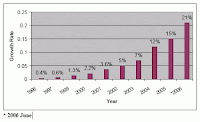When we try to apply Information and Communication Technology (ICT) in the complex development process, one main challenge we face is the development of the necessary ICT infrastructure, especially in remote areas. Most of the ICT for Development (ICT4D) initiatives face the issue of sustainability due to the high cost of "last-mile connections".
As an example the Nenasala (Telecentre) initiative implemented under the e-Sri Lanka, ICT4D master plan in the country is facing many challenges of sustainability due to the connectivity cost as high as 30,000 LKR per month (for expensive wireless satellite connection). Newly introduced wireless last mile technologies such as Wi-MAX and HSPA can provide the same connectivity for a cost as low as 4,000 LKR. Dialog Broadband extended it services by providing low cost Wi-MAX wireless connections to some selected Nenasalas in different parts of the country.
When compared with wired connections, wireless is cheaper to implement and maintain specially in remote areas. So developing countries like Sri Lanka can get benefits of new wireless technologies and that would trickle down to all the citizens of the country. The fact that setting up wireless systems is so cheap has meant that its use has grown exponentially. As a result of this many have pinned their hopes on the wireless delivery of voice and data across Asia and other remote locations worldwide.

Mobiles Phones per 100 People in Sri Lanka (Source: TRC)
Wireless technologies play an important role in extending access to voice and data communications services to marginalized groups in society, especially remote areas in the country. The present rates of growth and levels of connectivity could not have been achieved without wireless in the access networks, for mobile as well as for fixed, and in the backbone networks. As per the World Information Technology Report, Sri Lanka has been positioned at the 66th place in the Network Readiness Index.
It is our hope that wireless technologies will continue to support uplifting Sri Lanka’s network infrastructure and allow people in the country to really reap the benefit of ICT and make national initiatives like e-Sri Lanka a successes.
Sameera.
No comments:
Post a Comment